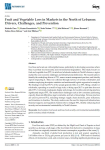Pano N., Karantininis K., Nehme N., Halwani J., Karameh J., Abou Abbass F., Mikhael A. (2025). Fruit and vegetable loss in markets in the North of Lebanon: drivers, challenges, and prevention. Resources, 01/08/2025, vol. 14, n. 8, p. 132.
https://doi.org/10.3390/resources14080132
https://doi.org/10.3390/resources14080132
| Titre : | Fruit and vegetable loss in markets in the North of Lebanon: drivers, challenges, and prevention (2025) |
| Auteurs : | N. Pano ; K. Karantininis ; N. Nehme ; J. Halwani ; J. Karameh ; F. Abou Abbass ; A. Mikhael |
| Type de document : | Article |
| Dans : | Resources (vol. 14, n. 8, August 2025) |
| Article en page(s) : | p. 132 |
| Langues : | Anglais |
| Langues du résumé : | Anglais |
| Catégories : |
Catégories principales 08 - ALIMENTATION ; 16 - TRANSPORT. INFRASTRUCTURE. ENERGIE ; 16.2 - InfrastructureThésaurus IAMM FRUITS ET LEGUMES ; GASPILLAGE ALIMENTAIRE ; MARCHE DES PRODUITS DE BASE ; PERTE ; PERTE APRES RECOLTE ; PERTE AU STOCKAGE ; CHAINE D'APPROVISIONNEMENT ; LIBAN |
| Résumé : | Food loss and waste are critical global issues, particularly in developing economies where they exacerbate food insecurity and environmental degradation. This study focuses on fruit and vegetable loss (FVL) in retail and wholesale markets in North Lebanon, a region marked by socio-economic challenges and infrastructural deficiencies. The research aims to identify the underlying drivers of FVL, assess current management practices, and identify aspects impacting it. Data was collected through surveys of seventy wholesalers and retailers employing descriptive statistics and multinomial logistic regression for analysis. The findings reveal that 85.7% of the sample generate little or no FVL. Being a retailer or wholesaler, operating on a small or large scale, or being open 24/7 or part-time does not affect FVL. Conversely, inadequate display and storage, hot weather, and pricing practices significantly impact FVL. The market faces challenges such as low consumer purchasing capacity, financial difficulties, legal constraints, and lack of knowledge. Various practices are used to prevent FVL, including strategic supply chain decisions, price reductions, and donations to charities. The study underscores the need for improved infrastructure, financial support, and regulatory frameworks to mitigate FVL, thereby enhancing food security and environmental sustainability in North Lebanon. |
| Cote : | En ligne |
| URL / DOI : | https://doi.org/10.3390/resources14080132 |







